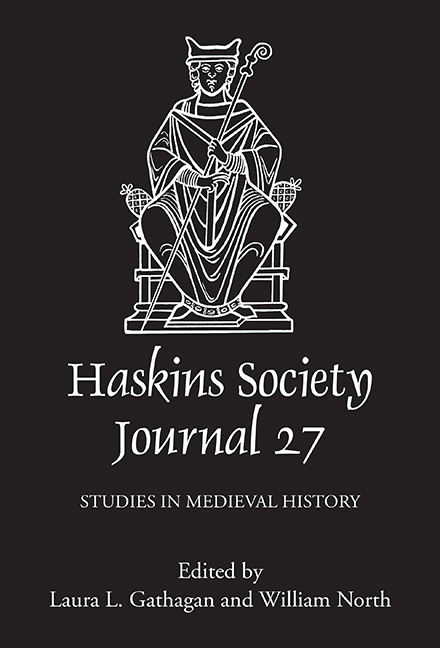Book contents
- Frontmatter
- Contents
- List of Figures
- Editors’ Note
- Abbreviations
- 1 Rural Settlement in Roman Britain and Its Significance for the Early Medieval Period
- 2 Holy Relics, Authority, and Legitimacy in Ottonian Germany and Anglo-Saxon England
- 3 Beyond the Obvious: Ælfric and the Authority of Bede
- 4 Byrhtferth’s Historia Regum and the Transformation of the Alfredian Past
- 5 Geoffrey le Bel of Anjou and Political Inheritance in the Anglo-Norman Realm
- 6 Observations on the Twelfth-century Historia of Alfred of Beverley
- 7 Helena, Constantine, and the Angevin Desire for Jerusalem
- 8 The Revolts of the Embriaco and the Fall of the County of Tripoli
- 9 Jewish Women, Christian Women, and Credit in Thirteenth-Century Catalonia
- 10 Military Entrepreneurs in the Armies of Edward I (1272–1307) of England
10 - Military Entrepreneurs in the Armies of Edward I (1272–1307) of England
Published online by Cambridge University Press: 07 May 2022
- Frontmatter
- Contents
- List of Figures
- Editors’ Note
- Abbreviations
- 1 Rural Settlement in Roman Britain and Its Significance for the Early Medieval Period
- 2 Holy Relics, Authority, and Legitimacy in Ottonian Germany and Anglo-Saxon England
- 3 Beyond the Obvious: Ælfric and the Authority of Bede
- 4 Byrhtferth’s Historia Regum and the Transformation of the Alfredian Past
- 5 Geoffrey le Bel of Anjou and Political Inheritance in the Anglo-Norman Realm
- 6 Observations on the Twelfth-century Historia of Alfred of Beverley
- 7 Helena, Constantine, and the Angevin Desire for Jerusalem
- 8 The Revolts of the Embriaco and the Fall of the County of Tripoli
- 9 Jewish Women, Christian Women, and Credit in Thirteenth-Century Catalonia
- 10 Military Entrepreneurs in the Armies of Edward I (1272–1307) of England
Summary
Two important historiographical traditions have combined in fruitful ways to illuminate the participation of the knights and landed gentry in the wars of the English kings from the latter thirteenth century through the fifteenth century. In his survey of warfare in 1980, the prominent French military historian Philippe Contamine argued for the importance what he called the ‛sociology of war’, making the case that the composition of armies accurately reflected the underlying structure of society. Contamine's ‘call to arms’ for scholars to investigate the sociological aspects of war was warmly received by specialists in English history. Scholars in this tradition were long accustomed to investigating the gentry not only as a social and political class, but also as a group that played a leading role in military conflicts of the English kings as mounted fighting men. The result has been an outpouring of studies, many prosopographical in nature, that have illuminated the participation of the knights and sub-knightly gentry in war, primarily as mounted fighting men.
The scholarly focus on the gentry in war has been facilitated by the edition during the nineteenth and early twentieth century of a substantial corpus of documents that shed light on landowners and their participation in royal military service. Paradigmatic in this context is Francis Palgrave's two volumes of Parliamentary Writs and Writs of Military Summons, published between 1827 and 1834, which remains a basic work for the analysis of the participation of knights and gentry in war. Indeed, Palgrave and other editors appear to have chosen quite explicitly to focus their attention on those documents that revealed the participation of the wealthier members of society in war, and to have ignored those texts that focused primarily on men who did not belong to the gentry. This is explained in large part by their focus on collecting writs of summons, documents that were issued to the wealthier members of society.
This source bias toward landowners is illuminated in one of the most important collections of published documents relating to warfare in the reign of Edward I (1272–1307), Henry Gough's Scotland in 1298. This volume, published in 1888, includes editions of royal documents relating to Edward I's campaign in Scotland in 1298 and has played a central role in subsequent prosopographical studies of the mounted forces who served this king.
- Type
- Chapter
- Information
- The Haskins Society Journal 272015. Studies in Medieval History, pp. 179 - 200Publisher: Boydell & BrewerPrint publication year: 2016



